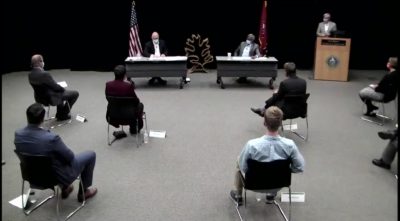By Cynthia Merse, Senior Writer, Piper Communications
 On October 20, the U.S. Department of Energy’s Office of Science and Oak Ridge National Laboratory (ORNL) hosted a virtual conversation about the role of the lab as an economic driver in the Knoxville-Oak Ridge community. The event’s featured speakers were Dr. Chris Fall, Director of the Office of Science, and Dr. Thomas Zacharia, Director of ORNL. Several prominent local leaders were also in attendance to ask questions and contribute to the discussion.
On October 20, the U.S. Department of Energy’s Office of Science and Oak Ridge National Laboratory (ORNL) hosted a virtual conversation about the role of the lab as an economic driver in the Knoxville-Oak Ridge community. The event’s featured speakers were Dr. Chris Fall, Director of the Office of Science, and Dr. Thomas Zacharia, Director of ORNL. Several prominent local leaders were also in attendance to ask questions and contribute to the discussion.
For this conversation, Dr. Fall wanted to learn what it means to have a national lab in the Knoxville-Oak Ridge community, what it means to be a good neighbor and a good employer, and how ORNL can play a role in driving economic development in East Tennessee.
The first topic of discussion was workforce development, specifically how to attract and retain scientific and technical talent. Dr. Fall and University of Tennessee (UT) President Randy Boyd noted the advantages of living in East Tennessee, such as low taxes and a great quality of life. Efforts around creating an entrepreneurial ecosystem were also discussed, including the connectivity that exists among resources like ORNL, UT, and the Tennessee Valley Authority (TVA).
“We have a spirit of cooperation that will allow us to take that connectivity to a new level in our efforts to create and invest in businesses,” said Boyd.
The conversation then shifted to public-private partnerships. Boyd spoke about the RevV! program, which gives Tennessee manufacturers access to ORNL’s researchers and facilities to solve manufacturing challenges. Dr. Fall mentioned the new INFUSE program, which will enable companies to work with ORNL to develop cost-effective, innovative fusion energy technologies.
Dr. Zacharia noted several significant partnerships ORNL has with the private sector including Volkswagen and Microsoft. He recognized the need to capitalize on these partnerships to encourage “leading-edge technology companies to come and invest in the cutting-edge technology being developed here.”
The next major topic was the role of higher education in supporting and furthering ORNL’s mission. At the center of discussion was the recently established Oak Ridge Institute at the University of Tennessee and its potential as a force multiplier for UT and ORNL. As a talent pipeline, Dr. Zacharia said the Institute “has the potential to be a difference maker. It’s my hope that the Institute’s students will choose to stay in East Tennessee and create the next $3 billion industry.”
As the conversation drew to a close, attention turned to raising Oak Ridge’s profile as a destination to live and work. Dr. Zacharia noted that UT, ORNL, and TVA launched a survey to learn about East Tennessee’s entrepreneurial climate and identify several steps that can be taken to attract more entrepreneurs to the area.
“We’re not starting from scratch here,” Dr. Fall said. “We have all the raw materials: a diverse research university, a diverse research laboratory. What’s the one thing that’s going to drive folks to come here? Once we figure that out, we need to go all in at the state level, regional level, and university level and talk about Oak Ridge as that place to be.”
